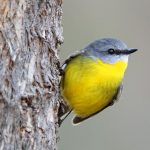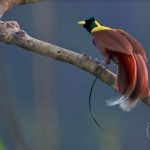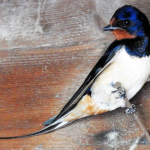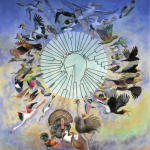Tag Archives: Birds
Cracking sex chromosome evolution via egg-laying birds and mammals
Scott Edmunds - January 7, 2021

Ducks, Emu’s, Platypus and Echidna’s, oh my! New work on the duck and other egg-laying animal genomes helps crack sex chromosomes evolution and diversity in a number of bird and monotreme species.
Sequencing The Eastern Yellow Robin: Sex chromosomes with a twist
Hans Zauner - September 4, 2019

An Australian team at Monash University discovered unusual, so-called neo-sex chromosomes in the genome of the Eastern Yellow Robin.
Genomes from paradise
Hans Zauner - January 30, 2019

New genomic data from five birds-of-paradise reveal genes that are shaped by selection and help explain the origin of their spectacular plumage. Birds-of-paradise, with their elaborate and colorful feathers and their complex courtship displays, are a school-book example of sexual selection. However, little is known about the genetic variants that distinguish the lavishly colored birds-of-paradise […]
Swallows and Optical Maps For Ever!
Scott Edmunds - November 30, 2018

While they say one swallow doesn’t make a spring, one swallow genome makes a welcome contribution to the avian genome club. Taking advantage of the latest genomic and optical mapping technologies, a team of Scientists from the University of Milan, California State Polytechnic University and the University of Pavia, have carried out the high quality […]
Sequencing Order: B10K Reaching for the Skies to Decode All Bird Genomes
Scott Edmunds - June 4, 2015

Announcing this week the B10K project, Guojie Zhang explains how they plan to sequence all the 10,000 bird genomes.
Open Data Publishing Goes New Zealand: A Cross Posting For Creative Commons Aotearoa
Nicole Nogoy - February 10, 2015

Our New Zealand based Editor Nicole Nogoy was asked by Creative Commons Aotearoa to write a guest blog on open licensing from a Kiwi perspective
A Flock of Bird Data Comes to Roost
Scott Edmunds - December 12, 2014

In the long history of humankind (and animal kind too) those who learned to collaborate and improvise most effectively have prevailed. —Attributed to Charles Darwin In 1839 Charles Darwin published his famous account of the 5-year second voyage of the HMS Beagle, describing the flora and fauna he encountered surveying South America and circumnavigating the […]